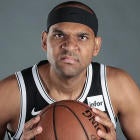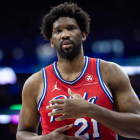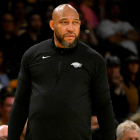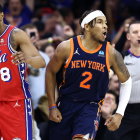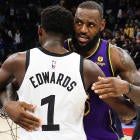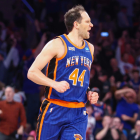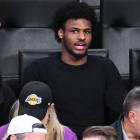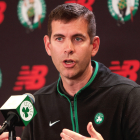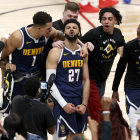BROOKLYN -- At the Brooklyn Nets' picturesque practice facility on the eighth floor of a warehouse by the water in Sunset Park, coach Kenny Atkinson says training camp has been all about working on "our Nets principles." But what, exactly, are those principles?
"Value the ball, play with pace, shot selection," Jared Dudley says without hesitation. "Those are the three things he has on the board every time."
Dudley, who is entering his 12th season and first in Brooklyn, then explains this in more detail: The Nets need every possession they can get; pace is more about popping the ball around in rhythm than speed; the point guards are paid to calm things down and generate good shots. He adds that Atkinson is also extremely focused on rebounding.
Talking to Dudley is a lot like talking to a coach or an analyst, and both jobs could be in his post-playing future. After accepting a mentorship role with the Phoenix Suns -- he was the guy calling Devin Booker out in film sessions for defensive mistakes and encouraging him to become a better passer -- it is time, Dudley believes, to show he can still play, too.
In a conversation with CBS Sports, he previewed the Nets' 2018-19 season and his role in it. This Q&A has been condensed and edited for clarity and flow.
CBS Sports: If you were doing my job as an analyst, what would you say about the Nets right now?
Jared Dudley: It is a team that is prepared to have a good season. The work that they put in is probably second to none in the league when it comes to offseason team activity work, weight room, conditioning and court work to give yourself an opportunity to succeed in the NBA through a course of 82. And that's not always said from a team standpoint. It's usually players throughout the league maybe work hard, but as a team collectively it's very rare.
And then I think with the team so far here, it's the depth of the team where literally from 1 to 10 you can flip-flop it. On any given day, the second unit can be better than the first unit. So it shows you the depth of it. It also shows you the lack of star [power] that we have, and the way that we're going to have to play together as a team offensively and defensively to have a chance to make the playoffs.
CBS: What are the challenges that come with not having stars?
JD: When you have a team that has no star players, sometimes the roles can get misconstrued -- Who's shooting the ball? How are the shots going to be [distributed] at the end of games? A star player, even when he's not shooting the ball in crunch time, he's making the decisions and making the plays. For us it's having a balance of who has it going that night, a read of the flow and knowing what you can do and can't do. And that's usually tough.
CBS: Have you been on teams where there hasn't been a natural hierarchy but you've figured it out?
JD: Milwaukee was one. We were the worst team in the NBA the year before I got there. We made the playoffs. Giannis wasn't our main scorer. Khris Middleton, who's there now, he had DNPs the first four games. Brandon Knight was the main scorer. It was by committee. We had a great bench. And then throughout the season it progressed and then Giannis started starting and then Khris Middleton became our main scorer and we kind of fed off that. But to be honest with you, the reason why we had a chance to make the playoffs is, defensively, we were animals.
CBS: Most young teams aren't great on that end. What ingredients have to be there?
JD: Communication is crucial. That's why young teams aren't usually good because their communication's not good because they're not confident in the communication. So, being confident in what you do, calling, talking it out. This team works hard enough. You can't just work hard enough in the NBA and be good. You have to work hard and smart. Knowing personnel, knowing their tendencies. That means watching film, not only reading the scouting report, understanding the scouting report, exactly what we want to do and the counters. And that's a mental game. Young guys, usually, physically they're athletic, they're fast. It's the mental approach where it takes a lot of catch-up.
CBS: When do you know if things are really clicking?
JD: It takes a while 'cause it depends on injuries, the flow. Usually by January, February, you have your lineups set, you don't want to be making changes by then and then you get in a rhythm. And then you might win seven out of 10. In Milwaukee, we were under .500 and then before the All-Star break we won eight of 10. It was like, holy shhh, OK, hold on, we got a chance.
CBS: Is it precarious to find a sort of rhythm and chemistry where the team is more than the sum of its parts?
JD: Chemistry, ego, contracts, all of it has to be in place. When guys feel like it's a contract year so you're forcing, you're stressing, you're trying to do that, what I try to tell them is GMs and scouts don't even look at your points per game. They look at your efficiency, your plus-minus. Everything's so analytical. You can average 15 and be a terrible analytic player -- you're not going to get paid. So do everything the right way, be efficient, be together and it will show up even more than what the stats show.
CBS: You averaged eight points before you got your deal. You talk to the young guys about that?
JD: Yes, I have told them. I shot 40 from the 3, I shot high from the field, good assist-to-turnover ratio, good plus-minus. People see that and they want that. And then obviously there's other factors besides that: Are you a good locker-room guy? Are you a good mentor? Are you a headcase? Are you coachable?
CBS: What do you want to prove this year?
JD: For me it's coming back in, obviously in tip-top shape ready to go this year, showing that I can still play on a young team, on a high-level team, if given the opportunity. When it comes to leadership-wise, showing it on the floor, where you see players getting better and that's by teaching through players. Coaching staff can do it, but it's in-game adjustments where a normal person might not be able to see it. It might be through a timeout, it might be me taking 'em out of the huddle when they're coming off the court because they did something bad -- and then, second half, they've figured it out because of something I told 'em.
CBS: You've said you want D'Angelo Russell to raise his assist average and make his teammates better. How about Jarrett Allen?
JD: He has to be the anchor for us. And because of that, we don't switch a lot of pick-and-rolls sometimes. Sometimes, he'll be back. So for him to average 1.8-to-2 blocks a game, I think he's going to play enough minutes. I really think a double-double, and him slowly progressing whereby in January, February, his numbers are a lot better than they were in October, November.
CBS: How about Spencer Dinwiddie?
JD: Spencer is a unique case. He could be our leading scorer even coming off the bench. He's very explosive. I think for him, somewhere averaging around 15-16 points because we need him to, five or six assists, but I could see his percentages being more efficient. Getting to that free throw line. If he can shoot around 37 from 3, 45 from the field -- I want him to be a more efficient shooter.
CBS: And then a guy you've already said you've been impressed by is Caris LeVert.
JD: He has the most upside when it comes to just athleticism, how hard he plays. I think for him, being a 15-point scorer, also making that outside shot. I think for him, being a respectable outside shooter, if he can do that, his scoring will go up even more because he gets to the paint so easily.
CBS: When you were younger, were you doing this same thing, setting goals for yourself?
JD: I always, always tried to be a 40-percent 3-point shooter. I never look at points per game, rebounds. I look at plus-minus. I always want to be positive when I'm out on the floor throughout the year. I want my defensive rating to be better when I'm the floor than anyone else.
CBS: You almost signed here two years ago largely because of Kenny Atkinson. Is anything about him different than you expected?
JD: Nothing. A guy who is holding you accountable, which is very rare in the NBA for a lot of coaches. He holds you accountable, from the coaching staff to players, the water boys that are here, the ball people. His energy is contagious. He gets after you when you're not doing your job. That's the key to a good coach.













